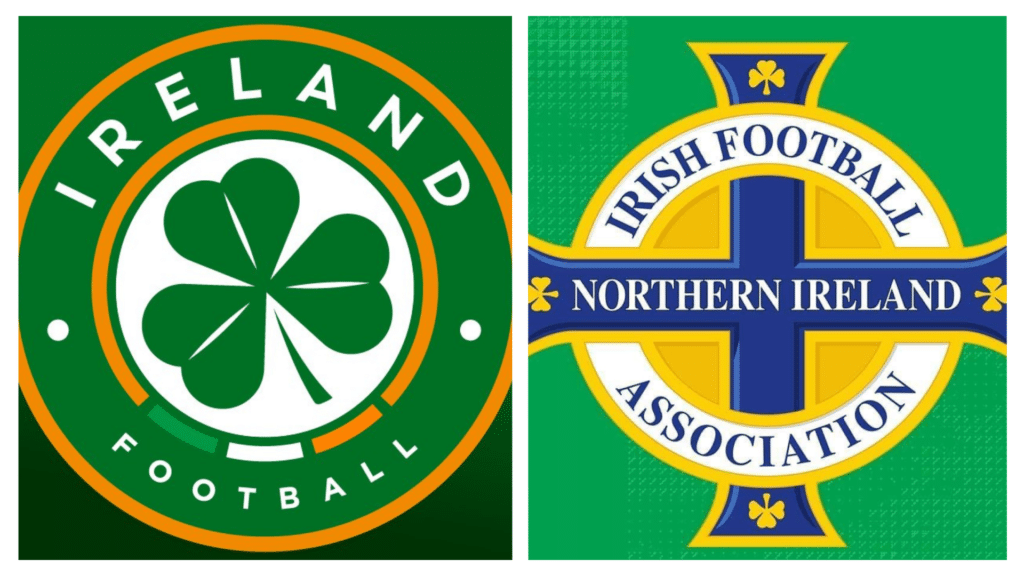Could an amalgamation solve both sides’ problems? We think Irish football should copy rugby and have an all-Ireland team. Here’s why.

Football has been bleak in recent years on both sides of the border. Neither side has qualified for a tournament since Euro 2016, and World Cup finals campaigns remain a distant memory for both.
But what if both sides pooled their relatively meagre resources together? Would the whole be greater than the sum of its parts?
We make the case that Irish football should copy rugby and have an all-Ireland team.
History – political complications
Between 1884 and 1924, the island of Ireland was represented on the football pitch by a single team overseen by the Irish Football Association (IFA) in Belfast.
However, things became difficult following the Partition of Ireland in 1920, which led to two separate states.
The Dublin-based Football Association of Ireland (FAI) was established in 1921 and began organising its own team in 1924. Both associations claimed jurisdiction over and selected players from the whole island.
Between 1928 and 1946, only the FAI team was FIFA-affiliated, giving rise to the strange situation in which two teams representing Ireland as a whole co-existed but could never compete in the same competitions.
Many professional players ended up representing both sides before FIFA decreed in 1953 that neither side could be called simply Ireland. Instead, the FAI team became the Republic of Ireland, and the IFA team became Northern Ireland.
FIFA rules also mandate that you cannot represent another country’s team after you have already made an appearance for another, regardless of issues like dual nationality.
However, we think the mode of operation between 1884 and 1924 works better and that there would be several benefits to an all-Ireland team. That’s why we think that Irish football should copy rugby.
Greater talent pool – more, better players to choose from

If Irish football copied rugby and had an all-Ireland team, the immediate benefit would be the greater talent pool.
Often, both Ireland and Northern Ireland will have a couple of great players but an overall poor team. However, an all-Ireland team, while perhaps not full of world-beaters, would be much stronger than the two separate teams could ever hope to be.
Think back to the mid-2000s. Imagine a single team could call upon the goalscoring exploits of both Robbie Keane and David Healy.
Admittedly, it remains to be seen if the two teams’ top scorers would complement each other, but at least it would offer the manager two excellent options rather than simply relying on one as both sides were wont to do.
Moreover, maybe if the huge unit Kyle Lafferty had the likes of Damien Duff and Aiden McGeady supplying him, he might have more than his 20 international goals. We should say that the same point applies to the aforementioned Healy.
RELATED: Top 10 best Irish soccer players of all time
No swapping allegiances – why Irish football should copy rugby and have an all-Ireland team
One team picking from a larger talent pool would also eliminate the worry of players changing allegiances.
A recent example of this was Sean Moore, a young star whose impressive exploits at Cliftonville earned him a move to the Premier League with West Ham United.
The Belfast-born winger represented Norther Ireland twice at under-18 level but has since played for the Republic seven times. Moore’s switching of allegiance is hardly an anomaly.
One of the highest-profile cases was that of former Manchester United midfielder Darron Gibson. Gibson, from Derry, played for Northern Ireland at the under-16 level before choosing to represent the Republic, for whom he ultimately earned 27 senior caps.
Fellow Derry man Shane Duffy also represented Northern Ireland from under-16 level right up until turning out for Ireland’s under-19 team. Duffy has since played 60 times for the Boys in Green, scoring seven goals and captaining the side on occasion.
The former Brighton centre-half said at the time of his decision, “It was difficult for me to leave because of what they’ve done for me in Northern Ireland since I was young. They brought me through the ranks, which gave me the chance to come to Everton.
“So it was hard to leave all the coaches and all the players, but it was always a case of wanting to come to my own country”.
Ireland legend James McClean also once represented Northern Ireland at youth level. He helped the under-19 side win the 2008 Milk Cup.
He was subsequently called up to the senior squad for a match against the Faroe Islands in 2011 but declined in order to remain eligible for the Republic.
Several other lower-profile players have also made the switch, which affects Northern Ireland more than the Republic. But an all-Ireland team would eliminate this risk and make for a stronger team and a stronger sense of unity, with no split allegiances.
